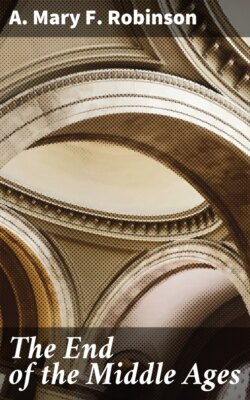Читать книгу The End of the Middle Ages - A. Mary F. Robinson - Страница 28
На сайте Литреса книга снята с продажи.
IV.
ОглавлениеTable of Contents
Death in life is the aim of the Mystic, and his consolation is the thought of his annihilation. There is not any rest for him, and no solace save in that which Suso calls “the desolate wilderness and deep chasm of unsearchable Deity.” To us of a later age to whom the greatest and most alluring promise of religion is the hope of Personal Immortality, it is hard to realize a fact which must strike every student; namely, that throughout the Middle Ages the most passionate motive of a hundred passionate sects, the dearest thesis of the deepest thinkers in the Church, was this intense desire of personal annihilation. As a fact, this frenzy after Nothingness cost the Church more heresies than any corruption in herself. The very doctors of the Church were tainted with it. The lowest of the people—poor, starved, and hunted fanatics—formed themselves into bands and brotherhoods to preach this comforting gospel of extinction. The books of Dionysius the Areopagite carried the Alexandrian theories of the One into every monastery in Europe. The Almaricians, the Vaudois, the followers of Ortlieb, the Beguines, the brothers and sisters of the Free Spirit, and many other sects of poor and wandering people, spread their fantastic corruptions of the same, throughout the working classes. From the twelfth to the sixteenth centuries, the desire of many a mystical saint was identical with the despair of atheists to-day. It was the extinction of the personal soul. The whirligig of time brings strange revenges.
Mysticism throughout the thirteenth and fourteenth centuries occupied, in the thinking and religious world, a position almost identical with that of Spiritualism in our day. Like its modern offshoot, mediæval Mysticism could be superimposed on any cult or habit; like Spiritualism, it lent itself equally to a grossly sensual, or an abstract and idealist interpretation. And Mysticism, therefore, appealed to an immense audience; to the ignorant and pretentious, dissatisfied with the Church’s authority, merely because it was authority; to the pure reformers, anxious to preserve religion and quit the formal and corrupted shows of it; to tender, pious, and dreaming souls, with no great hold upon the world of fact; to the abstract reasoner, eager to preserve his faith while letting untenable dogma slip away. The authorized religion occupied a singular position towards these Mystics, who formed, as it were, a Church within the Church. Afraid to quite disown them or, indeed, to openly disapprove, lest she might thereby weaken her own hold, yet conscious all the while that these theories of her children were scarcely less subversive of her own supremacy than those of any heretic or atheist, the Church burnt one Mystic and canonized another, with an impartiality born of vacillation. The influence of the Mystics was indeed immense, and too serious to be lightly regarded. They promised to destroy the prison, the canker, the disease of Self—to let the freed soul loose from the body, to vanish for ever in the Divine darkness of the unimaginable Abyss; they made the comfort of many a dreaming soul, tortured by the ineradicable memory of human sin. They offered to the tired thinker, the starved and weary labourer, the broken nun, the harassed townspeople, an attraction which the Church herself dared not openly afford; and many who had wandered away from the hard-and-fast, strict-and-narrow fold of Rome, found a refuge in Mysticism, who might else have thrown aside all claim to faith. Even as to-day, many are Spiritualists who otherwise would certainly be Agnostics. For Spiritualism insists on none of the bonds or dogmas of religion, and offers a palpable proof to its believers of that which religion only promises; that is to say, the Immortality of the Soul, that golden mirage-fountain of our thirsty modern world. This was precisely the position of mediæval Mysticism, only, as we know, it was Rest, not Life, that she offered; extinction, and not continuance; not Paradise, but the Abyss.
